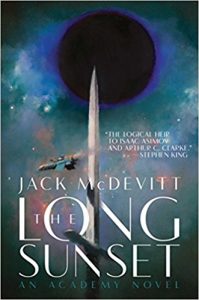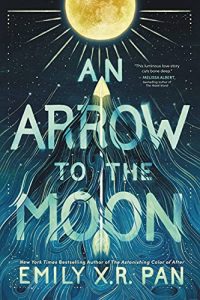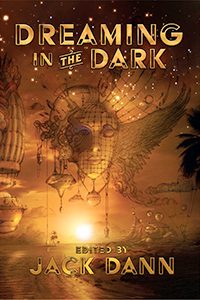Russell Letson Reviews The Long Sunset by Jack McDevitt
 The Long Sunset, Jack McDevitt (Saga 978-1-4814-9793-0, $27.99, 451pp, hc) April 2018. Cover by John Harris.
The Long Sunset, Jack McDevitt (Saga 978-1-4814-9793-0, $27.99, 451pp, hc) April 2018. Cover by John Harris.
Here I am, still reading novels from two very long-running series. How could I not? These books have been, like rolling stones, gathering momentum over the years, developing their characters and worlds and (to mix the metaphor) poking and prodding at their givens and motif-sets and turning them around to find new angles or provide better views of old ones. They are also, apart from their well-developed backgrounds, familiar casts, and evolving thematics, quite satisfying to read individually. So: pleasures, yes, but not a smidgeon of guilt.
Jack McDevitt’s Academy series started tracing the career of 23rd-century starship pilot and incidental explorer/archaeologist Priscilla Hutchins, with The Engines of God (1994) and seemed to come to a stopping place five books later with Cauldron (2007), in which she is officially retired and her old home organization, the Academy, defunded and dismantled. But then came Starhawk (2013), an origins story in which Hutch makes her bones by coping with bureaucratic and space-adventurous challenges. And apparently you can’t keep a good pilot down, since a new novel now returns to the main sequence, calling Hutch out of retirement once again to wrestle with the challenges posed by politicians, pundits, desk jockeys, astronomical wonders, and alien worlds.
The Long Sunset continues the thematic thread of the withering of interstellar exploration that emerged in Odyssey and Cauldron. The driving force behind this pullback was initially economic (why spend money on starships and alien archaeology and low-return exploration when the Earth needs fixing?), to which is now added a note of paranoia: what if some alien disease or hostile force follows one of our ships home and runs amok? Even the reception of a remarkable video from 7,000 lightyears away – of a waterfall on what looks like a very Earthlike planet – can’t budge the fearful politicians in charge, and only by defying orders does a small expedition manage to take off in a starship that isn’t quite fully serviced and refitted.
What Hutch and her expedition-mates find is a catalogue of the dangers lurking Out There – though not the kind of evil-alien threat imagined by the public back home. A black hole is passing through the volume of space where the video seems to have originated, eating suns and tearing apart solar systems. The explorers find once-living worlds, empty ruins, and some intriguing artifacts suggesting long-past, large-scale engineering activities in the neighborhood. Right in the path of the black hole, they also find Volaria, a world inhabited by civilized, reasonable, good-natured creatures, unaware that their home is only decades away from destruction.
The story combines elements familiar from Hutch’s previous adventures: archaeological and cosmological puzzles, marooning and rescue, First Contact, conflict with hidebound or politically-motivated authorities, and over all a picture of a universe peppered with life. Our neck of the galactic woods has been a busy place – there are a few planet-bound intelligent species, plus evidence of now-vanished starfaring civilizations that engaged in ambitious projects and even heroic rescue attempts of living worlds threatened by cosmic disaster. That brings up the question of how to help the doomed Volarians. The logistical, physical-world problem is tied up with the terrestrial political problem of changing the fearful minds that are determining the future of interstellar travel – of challenging views that focus on the dangers rather than the wonders, opportunities, and moral demands that come along with the power to travel among the stars.
Hard-SF and exotic-societies enthusiasts are likely to find the Academy novels rather mild stuff. McDevitt is not a futurologist, and his picture of the 23rd century Earth is not at all exotic, let alone edgy or cyberpunky, despite the existence of FTL, gravity control, close-to-personhood AI, and serious life extension. His sense of wonder is focused more on the interstellar Out There and what it means to engage with that environment – and what it means to solve problems, whether it’s a lander crash or an oncoming planetary destruction. In The Long Sunset there is the added question of the cultural risk-benefit calculations that define what it means to be a human in a universe of mixed marvels and perils.
This is a very familiar and perhaps old-fashioned kind of SF, a mixture of space travelogue, alien encounter, problem-solving, and political-social commentary. It reminds me a bit of Poul Anderson, another writer who poses political and moral questions against a backdrop of a physical world of dangerous wonders. McDevitt’s laid-back, middle-American affect is quite different from Anderson’s sometimes gloomy, Nordic sense of fate, but both like to play with scale – to set the human (or intelligent-alien) against titanic, impersonal cosmic machineries. The Long Sunset begins and ends with the image of a statue of an alien figure on Iapetus, left behind by the mysterious visitors called the Monument Makers, which Hutch reads as a recognition of “something other than the sense that the universe was a cold and uncaring place…. an understanding that we are all in it together.” The notion that We Are Not Alone might scare the bejabbers out of some folk, but for Hutch – and McDevitt, one suspects – it’s a source of comfort and inspiration.
Russell Letson, Contributing Editor, is a not-quite-retired freelance writer living in St. Cloud, Minnesota. He has been loitering around the SF world since childhood and been writing about it since his long-ago grad school days. In between, he published a good bit of business-technology and music journalism. He is still working on a book about Hawaiian slack key guitar.
This review and more like it in the March 2018 issue of Locus.
 While you are here, please take a moment to support Locus with a one-time or recurring donation. We rely on reader donations to keep the magazine and site going, and would like to keep the site paywall free, but WE NEED YOUR FINANCIAL SUPPORT to continue quality coverage of the science fiction and fantasy field.
While you are here, please take a moment to support Locus with a one-time or recurring donation. We rely on reader donations to keep the magazine and site going, and would like to keep the site paywall free, but WE NEED YOUR FINANCIAL SUPPORT to continue quality coverage of the science fiction and fantasy field.








Jack McDevitt is one of my favorite authors and a great example that the SFF genre fiction is actually literature about us and about today. He is very good at this – which is probably the reason why some critics say his world is too much like ours.
Another strength of his writing is the cultural context of the worlds. Not many authors the days bother with literature/music/art of the worlds. McDevitt actually does it. Time Travelers Never Die is a good example for that. It is a story of two, I would say, privileged middle-age American academics that re given the chance to travel across history and meet some pretty significant historical figures. This is a metaphor of something we all do in high school, but here the impact is ten, no million times stronger that what the typical education system can accomplish.
His other series about Alex Benedict is even more transparent presentation of the same idea – the characters directly peek into out time through the ancient (for them) historic artifacts. It is funny and entertaining to dig in the text the pronouncements that McDevitt gives to our time.